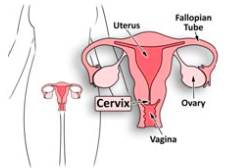Cervical Cancer
What is cervical cancer?
Cervical cancer is cancer of the cervix, which is located at the opening of the uterus.

How common is it?
Worldwide, cervical cancer is the fourth most common cause of cancer death in women. In India cervical cancer is the 2nd leading cancer in women after breast cancer.
Most cervical cancers are diagnosed in women who have never been screened. Therefore, it is even more important for women to have themselves checked regularly for this cancer”
What are the risk factors for cervical cancer?
In many cases, cervical cancer can be linked with known risk factors for the disease. Some risk factors can be avoided, while others cannot. Some risk factors include:
- An irregular screening history: Women who have not regularly had a Pap test (smear) are at increased risk of cervical cancer.
- HPV Infection: Some types of human papillomavirus (HPV) are transmitted sexually and can infect the cervix. Cervical infection with HPV is the primary risk factor for cervical cancer. However, only a very small percentage of women infected with untreated HPV will develop cervical cancer.
- Sexual History: Females who begin having sexual intercourse before the age of 16 and females who have had many sexual partners are at a higher risk of HPV infection and developing cervical cancer. The prevention of sexually transmitted diseases reduces the risk of cervical cancer.
- Smoking: Cigarette smoking is associated with an increased risk of cervical cancer.
- HIV Infection: Women who have been infected with HIV have a higher-than-average risk of developing cervical cancer.
What are the symptoms of cervical cancer?
The most common symptom is vaginal bleeding (following intercourse or between menses) and vaginal discharge. However, precancerous changes of the cervix (abnormal pap smears, dysplasia, precancer) usually do not cause pain or any symptoms. Therefore, it is very important that all women be screened by a pelvic exam, ultrasound test and a Pap test since precancerous changes are usually asymptomatic.
Can cervical cancer be prevented?
We can and we must do our efforts towards preventing this cancer:
1. Regular check up with women health specialist
2. Annual Ultrasound scan of pelvis along with Regular pap smear according to The American College of Obstetricians and Gynecologists guidelines:
- Cervical cancer screening should begin at age 21 years, regardless of sexual history.
- For women aged 21 to 29 years, screening is recommended every 3 years with only a Pap test (no HPV test).
- For women 30 years and older, co-testing with Pap and HPV should be done every 5 years, or Pap test alone every 3 years.
- Routine Pap testing should be discontinued (stopped) in women who have had a total hysterectomy for benign conditions and who have no history of CIN (cervical intraepithelial neoplasia) grade 2 or higher.
- Cervical cancer screening can be discontinued at age 65 in women who have 2 consecutive normal co-test results or 3 consecutive normal Pap test results in the past 10 years, with the most recent normal test performed in the past 5 years.
- Cervical cancer vaccine at appropriate age
The cervical cancer vaccine, is approved for girls and women ages 9 to 26 and protects against the development of cervical cancer. The vaccine, which also protects against genital warts (and also has been approved for boys for this purpose), works by triggering the body& immune system to attack certain human papillomavirus (HPV) types, which have been linked to many cases of cervical cancer. It is best to get the vaccine before the start of sexual activity. The vaccine consists of a series of 3 shots, with shot 2 coming 2 months after the first, and shot 3 coming 6 months after the first.
- ANNUAL CHECK UP
- ANNUAL ULTRASOUND PELVIS
- ROUTINE PAP SMEAR
- CERVICAL CANCER VACCINE
“My vision is to spread awareness; to support and serve everyone in recognising that health is their most valuable asset.”
+91 9811020477
- Jeewan Mala Hospital, Karol Bagh
- Apollo Spectra Hospital, Karol Bagh
- Wish Clinic, Vasant Vihar

